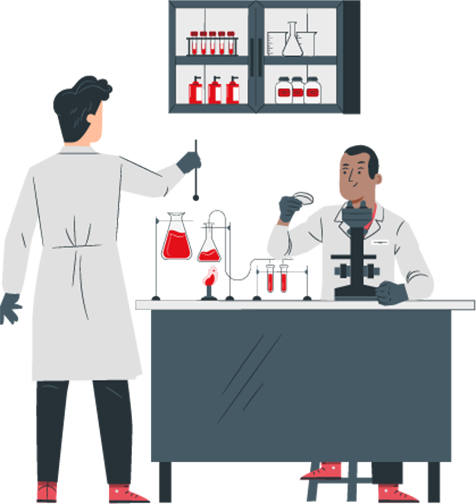
Let Dr. Gaur
Recommend A Package For You
STARTING FROM ₹399*

100+ TrustedLabPartners #OurBloodRelations


100+ TrustedLabPartners#OurBloodRelations


TLC and DLC Test in Kolkata
TLC stands for total leukocyte count & DLC stands for differential leukocyte count. Tests are available for the same.
Leukocytes are also called white blood cells (WBCs) and help our immune system in fighting several diseases. These are of five types: neutrophils, basophils, eosinophils, monocytes, and lymphocytes. A chronic ailment which may require urgent attention can be signified by an endless rise in the levels of WBCs.
Read further to know more about the TLC and DLC test in Kolkata, including test price and cost, preparation, understanding test results, etc.
AN OVERVIEW
About TLC and DLC test
Why is the TLC and DLC test done?
The TLC & DLC tests are done:
- As a component of complete blood count (CBC) tests during regular health checkups.
- For examining infections and inflammation.
- To diagnose ailments that lead to lowering of WBCs, such as bone marrow disorders.
- For monitoring the functioning of bone marrow.
- For monitoring chemotherapy treatment.
What does the TLC & DLC test measure?
The total leukocyte count (TLC) provides us the total number of white blood cells (WBCs) present in a given volume of blood.
On the other hand, the percentage of different types of WBCs is measured by the differential leukocyte count (DLC).
Risks/side effects of TLC & DLC test :
No side effects are associated with a TLC and DLC test, although, for a few days, some pain might be felt in the area from where the blood is taken using a needle.
ABOUT US
Why choose Flebo.in's home collection services?
At Flebo.in, we thrive to deliver quality healthcare & diagnostic services to our valuable customers at their doorsteps. We are just a call or few clicks away to book your pathology test or a health package. Avail our services from the comfort of your home, office, or while you’re on the go.
Choose from a wide range of certified labs which undergo regular audits to ensure accuracy. Delay in reporting of your test result, without prior information, entitles you for a refund. Your Flebo.in account maintains the history of your test reports, irrespective of the chosen lab.
Our Phlebotomists are trained and qualified under a unique program designed by industry experts, who use FDA approved pre-analytical consumables for sampling.
Customer satisfaction is our utmost priority, and a Phlebotomist from Flebo.in will guarantee you:
Punctuality – Sample collection at your chosen time
Attentiveness – Concerned to handle your pre-test anxiety
Safety – Ensuring proper hygiene during the visit
Skillfulness – Certificate shared with you before the visit
FREQUENTLY ASKED QUESTIONS
FAQs
How to prepare for the TLC & DLC test?
No preparations are required for the TLC and DLC test. However, before the test, do inform your doctor about any medications you are currently taking.
How is the TLC & DLC test performed?
TLC and DLC test is done by withdrawing a blood sample from your vein through the use of a needle. It can be performed at a preferred clinic, hospital, or a laboratory. Home test sample collection facilities are also available.
When is the TLC and DLC test performed?
The TLC and DLC test can be done if a person is experiencing the following symptoms:
- Fever
- Chills
- Body ache
- Headache
- Fatigue
- Bruising
- Weight loss
- Inflammation
- Allergy


THINGS TO KNOW AFTER GETTING TESTED
Interpreting the TLC and DLC test results
Reference range:
The reference range for the TLC & DLC test is given below:
| Tests | Normal Range |
| TLC
At birth 1-3 years 4-7 years 8-12 years Adults |
10,000-25,000/cu mm 6,000-18,000/cu mm 6,000-15,000/cu mm 4,500-13,500/cu mm 4000-10500/cu mm |
| DLC
Neutrophils Lymphocytes Eosinophils Monocytes Basophils |
40-80 %
20-40% 1-6 % 2-10 % 0-1 % |
Different factors are responsible for determining the normal range of leukocyte count, including age, gender, health state, history of previous ailments, vaccines, etc. The range also may vary among different laboratories.
WBC count in the blood can be influenced by various ailments, such as immune system disorders, autoimmune conditions, cancer, etc. In some instances, more than one type of the white blood cell may be present in abnormal amounts.
Differential leukocyte count is used for diagnosing different diseases in the body. Further tests might be done to confirm the DLC test results and also to provide therapy.
Leukocytosis refers to an elevation in TLC by more than 10,000/cu mm.
Leucopenia refers to a decrease in TLC by less than 4,000/cu mm.
Leukocytosis can be caused due to:
Inflammatory conditions, including rheumatoid arthritis; allergies; different types of cancer, including leukemia and myeloproliferative neoplasm.
Conditions that lead to necrosis (tissue death), including severe burns, trauma, surgery, etc.
Smoking, doing excessive exercise, pregnancy, intaking drugs like corticosteroids, epinephrine, heparin, lithium, etc.
Leukopenia can be caused due to:
Myelo suppression as a result of poisons, radiation, or chemotherapy.
Bone marrow problems that restrain the production of leukocytes, including myelodysplastic syndrome, deficiency of vitamin B12, etc.
Neutrophil Count:
Decreased levels of neutrophil, commonly known as neutropenia, can occur during aplastic anemia, autoimmune disorders, drug reactions, or chemotherapy.
Increased levels of neutrophil, commonly known as neutrophilia, can occur during acute bacterial infections, inflammation, and burns.
Lymphocyte Count:
Decreased levels of lymphocytes, commonly known as lymphopenia, can occur during bone marrow damage, aplastic anemia, autoimmune disorders.
Increased levels of lymphocytosis, commonly known as lymphopenia, can occur during acute viral infections, tuberculosis, lymphocytic leukemia.
Monocyte Count:
Decreased levels of monocytes are rare to be found.
Increased levels of monocytes, commonly known as monocytosis, can occur during chronic infections like tuberculosis, bacterial endocarditis, collagen vascular disorders, and inflammatory bowel diseases.
Eosinophil Count:
Decreased levels of eosinophil are rare to be found.
Increased levels of eosinophil, commonly known as eosinophilia, can occur during asthma, allergies, drug reactions, and parasitic infections.
Basophil Count:
Decreased levels of basophil are rare to be found.
Increased levels of basophil, commonly known as basophilia, can occur during chronic myeloid leukemia (CML).
Customer Reviews
Some of Flebo.in's customers reviews
STEPS OF BOOKING
Steps to book TLC and DLC test for home collection in Kolkata
Our state of the art user interface makes the process of booking a painless sample collection test hassle free, time efficient, and convenient. Instead of searching “TLC and DLC test near me” or “TLC and DLC test in Kolkata”, you can do the following:
Phone Number
an OTP
Details
Appointment



